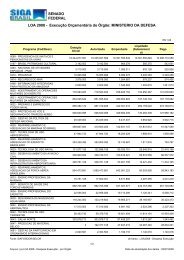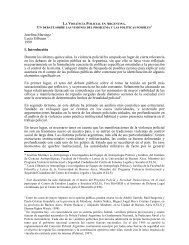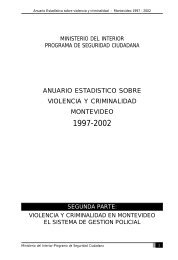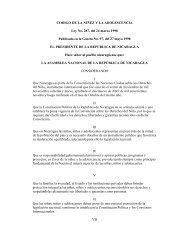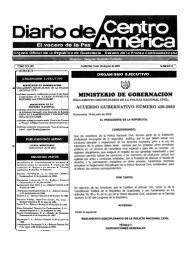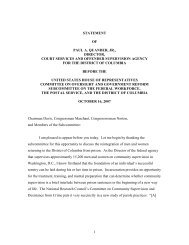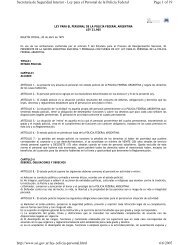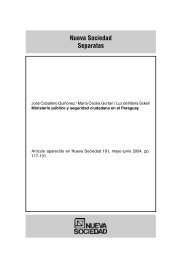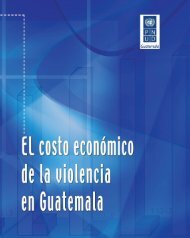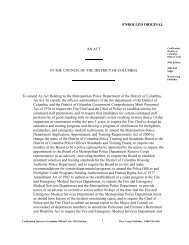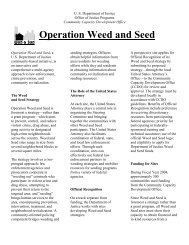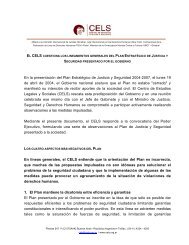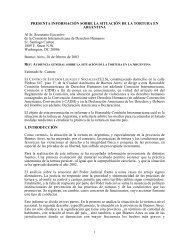Venezuela: The Life and Times of the Party System - Political ...
Venezuela: The Life and Times of the Party System - Political ...
Venezuela: The Life and Times of the Party System - Political ...
Create successful ePaper yourself
Turn your PDF publications into a flip-book with our unique Google optimized e-Paper software.
ecome available only after <strong>the</strong> campaign is over <strong>and</strong> almost never cover <strong>the</strong> total expenditures.<br />
This situation undermines <strong>the</strong> democratic quality <strong>of</strong> representation <strong>and</strong> has led, for example, to<br />
<strong>the</strong> adoption <strong>of</strong> public policies favorable to special interests that contributed to <strong>the</strong> financing <strong>of</strong> <strong>the</strong><br />
campaign, to <strong>the</strong> inclusion <strong>of</strong> corporate <strong>and</strong> interest group representatives in state bureaux, <strong>and</strong><br />
even at <strong>the</strong> level <strong>of</strong> <strong>the</strong> Cabinet, <strong>and</strong> to administrative corruption <strong>and</strong> fraudulent use <strong>of</strong> state<br />
resources. 1<br />
To redress <strong>the</strong>se problems, <strong>the</strong> 1978 Ley Orgánica del Sufragio authorized participation<br />
by <strong>the</strong> CSE in campaign finance. During election years, part <strong>of</strong> <strong>the</strong> CSE budget is reserved for<br />
financing party campaigns. Funds are distributed proportionally among <strong>the</strong> parties that obtained<br />
between five <strong>and</strong> ten percent <strong>of</strong> <strong>the</strong> total vote for <strong>the</strong> Chamber <strong>of</strong> Deputies in <strong>the</strong> most recent<br />
elections. <strong>The</strong> CSE may also purchase media time for party propag<strong>and</strong>a. This time is distributed<br />
equally to parties that won at least five percent <strong>of</strong> <strong>the</strong> vote in <strong>the</strong> last legislative elections. 2<br />
Never<strong>the</strong>less, given <strong>the</strong> length, sophistication, <strong>and</strong> high costs <strong>of</strong> campaigns, <strong>the</strong>se funds cover<br />
only a small part <strong>of</strong> <strong>the</strong> cost <strong>of</strong> campaigning for <strong>the</strong> large parties.<br />
Criticisms <strong>of</strong> <strong>the</strong> Electoral <strong>System</strong>, <strong>and</strong> <strong>the</strong> Move Toward Reform<br />
<strong>The</strong> intensity <strong>of</strong> criticisms <strong>of</strong> <strong>the</strong> party <strong>and</strong> electoral systems during <strong>the</strong> 1980s <strong>and</strong> early<br />
1990s highlight <strong>the</strong> central role held by political parties in <strong>Venezuela</strong>n political life. It has been<br />
argued that <strong>the</strong> excessive domination by parties ‘suffocates’ civil society, that <strong>the</strong> parties have<br />
become pragmatic <strong>and</strong> corrupt machines beyond <strong>the</strong> reach <strong>of</strong> democratic <strong>and</strong> ethical controls,<br />
etc. <strong>The</strong> barrage <strong>of</strong> criticism to which <strong>the</strong> parties are being subjected is increasing <strong>and</strong> indeed<br />
worrisome. Numerous public opinion polls confirm this impression. 3<br />
Reformers have sought to change <strong>the</strong> role <strong>and</strong> conduct <strong>of</strong> <strong>the</strong> parties <strong>the</strong>mselves.<br />
Proposals for reform have had three short-term goals. First, <strong>the</strong>y seek internal democratization <strong>of</strong><br />
<strong>the</strong> parties, especially with regard to <strong>the</strong> c<strong>and</strong>idate selection process. Second, <strong>the</strong>y argue for <strong>the</strong><br />
establishment <strong>of</strong> conditions for ‘fair play’ in interparty competition. Finally, institutional reform is<br />
1 On <strong>the</strong>se issues see Rey et al. (1981, passim).<br />
2 Ley Orgánica del Sufragio, article 155.<br />
3 In a recent national survey, 87 percent <strong>of</strong> respondents agreed with <strong>the</strong> statement that “<strong>the</strong><br />
parties only care about winning elections.” Of respondents who identified <strong>the</strong>mselves as<br />
militantes [party activists], 66.4 percent agreed that “<strong>the</strong> parties are corrupt.” This figure differed<br />
little from <strong>the</strong> responses <strong>of</strong> those identifying <strong>the</strong>mselves as simpatizantes [party identifiers] (70.3<br />
percent) <strong>and</strong> independents (68.9 percent). <strong>The</strong> statement that “<strong>the</strong> parties are controlled by<br />
cogollitos [small closed leadership circles] was agreed to by 87.6 percent <strong>of</strong> militantes, 91.5<br />
percent <strong>of</strong> simpatizantes, <strong>and</strong> 89.3 percent <strong>of</strong> independents. Some 88 percent <strong>of</strong> <strong>the</strong> sample<br />
agreed that “<strong>the</strong> parties talk a lot but don’t do anything.” <strong>The</strong> statement that “<strong>the</strong> parties are<br />
concerned about solving <strong>the</strong> country’s problems” was disagreed with by 49.7 percent <strong>of</strong><br />
militantes, 60.8 percent <strong>of</strong> simpatizantes, <strong>and</strong> 60.3 percent <strong>of</strong> independents. <strong>The</strong>se data are from<br />
polling conducted by Data Analysis, CA, commissioned by COPRE after <strong>the</strong> 1989 municipal<br />
elections.



